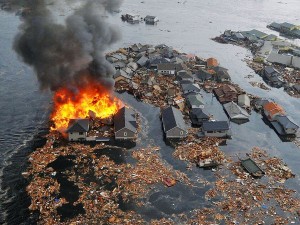The Economic Aftershock of Japan
 By Greg Hunter’s USAWatchdog.com (revised)
By Greg Hunter’s USAWatchdog.com (revised)
The news from Japan is grim. At least 10,000 people are reported dead from the killer quake that rocked the island nation last week. Likely, the death toll will go much higher in the coming days. There have been at least 3,400 buildings destroyed by the flood of a 3 story tsunami, the 8.9 earth quake or by fire. Oil refineries were damaged and shut down. Roads and bridges were destroyed by the quake and the rail system was wiped out in some areas. On top of all this, several nuclear reactors are badly damaged and one even exploded.
A Reuters story said yesterday, “A grim-faced Prime Minister Naoto Kan described the crisis as Japan’s worst since 1945, as officials confirmed that three nuclear reactors were at risk of overheating, raising fears of an uncontrolled radiation leak. “The earthquake, tsunami and the nuclear incident have been the biggest crisis Japan has encountered in the 65 years since the end of World War II,” Kan told a news conference. . . . As he spoke, officials worked desperately to stop fuel rods in the damaged reactors from overheating. If they fail, the containers that house the core could melt, or even explode, releasing radioactive material into the atmosphere.” (Click here to read the complete Reuters story.) The question regarding containment of the damaged nuclear reactors in Japan is a big one. And, assessment of lasting damage to the surrounding areas is also in question.
The 8.9 magnitude earthquake (now updated by officials to 9.0-9.1 quake) is the “Black Swan” of black swan events. (A “Black Swan” event is something random and totally unpredictable. This term was coined by Nassim Nicholas Taleb, a finance professor and former Wall Street trader.) No one could have seen this enormous quake and its aftermath coming. However, now that much of the damage is done, we can anticipate some of the economic aftershocks from Japan.
On the oil front, it looks like prices will go down because Japan will not be using as much oil in the near term. The economy there is understandably grinding to a halt. Rescue operations and humanitarian missions are in full swing. Humanitarian needs of millions of people will continue for weeks and even months. When things do settle down, construction companies will get work rebuilding Japan, but rebuilding is not the same as business expansion. Rebuilding is just getting things back to where they were before the quake, but regardless, Japan will rebuild its cities, roads, refineries, rail system and infrastructure. That will take money–and lots of it.
One way for Japan to get money is to sell some of its $882 billion in Treasury bonds, and that is just what happened last Friday. The Wall Street Journal reported, “. . . Japanese investors sold U.S. government bonds to repatriate money home following the earthquake that hit that country. . . . Long-dated Treasurys were the biggest losers, reflecting concern that Japanese insurers may continue to sell such securities to pay insurance claims in the coming sessions. Such selling, however, was partly offset by buying from some investors seeking safety from the political turmoil in the Middle East and the euro-zone’s sovereign-debt woes.” (Click here to read the complete WSJ story.)
Japan is the second largest holder of U.S. debt. If Japan keeps selling, expect QE3 to begin sooner than expected. Other countries holding U.S. Treasuries may also sell if they fear an all-out U.S. bond rout. That could send interest rates up and mortgage rates would follow. There is another view reported by Reuters Friday, “The BOJ (Bank of Japan)is more likely to buy Treasuries to drive the exchange value of the yen down to stimulate the economy and help exports.” Christian Cooper, head of U.S. dollar derivatives trading at Jefferies & Co in New York, said he expected any Japan-related sell-off to be limited. “I believe we have reached a critical point where the disaster is so severe the BOJ will engineer liquidity mechanisms that will reduce the likelihood of forced selling in the Treasury market,” Cooper said. (Click here for the complete Reuters story.)
Even if Japan doesn’t sell a large chunk of Treasuries, it certainly will not be buying any in the future. Knock out the number two largest buyer of U.S. debt, and that will surely put upward pressure on interest rates. The Fed desperately wants interest rates to stay low so the U.S. economy will not jump off the tracks and plunge into depression. If rates do rise, expect the Fed to turn up the printing presses to hold rates down and fuel more inflation. This problem seems small compared to what the Japanese people are dealing with now. Please pray for Japan.












“The Skim Begins”- Japan’s nightmare will allow those central planners and central bankers(under the illusion of rebuilding this now former industrial civilization!) in reality…..their goal will be:”Destroyed Nation States must become City States”! Think of it as re-coloniztion,after all,thats the real prize ( all in the name of foreign aid or the one thats used best “humanitarian-aid”- Your correct about praying- our prayers hopefully will be heard as soon as there said,for Japan and the rest of the entire planet!
Thank you Norm for your views.
Greg
It seems like the BOJ buying treasuries would be more than enough to offset repatriation of dollars to Yen by investors. Wouldn’t the dollar and treasuries also catch a safe-haven bid right now due to not only this crisis but geopolitical concerns? This would also buy more time for the Fed to continue on its present course.
My thinking is: weakening yen vs. dollar -> long overdue dollar rally -> US stock market correction, Japanese equities rally.
Of course the dollar is doomed in the long-term.
Nate,
Yes, that could happen, the dollar could go up in value temporarily. I tried to present both sides to the dollar argument. I think a country with the debt of Japan will opt to sell at least some of its Treasuries to avoid taking on too much debt but who knows what will happen. You are correct the dollar is doomed. I’d rather be a year early than a day late getting off the U.S. dollar bus to worthlessness. Thank you for your point of view.
Greg
Hey Greg,
Thanks bud!
This is a highly informative article.
markm
MarkM,
Thanks for the continued support man!
Greg
What I have been warning about. Fragile systems not being protected against what is as know potential disasters. Governments lack of long term planning and proper priorities. The preference to fighting terrorism and military to fighting Wars instead of hardening our infrastructure. This Earthquake in Japan is the trigger to a U.S. deeper recession (double dip) and move into a Global one. Paper investments will take a huge hit and inflation will accelerate. Commodities Gold, Silver, Oil, Food will all rise especially most will be the bare necessities. Huge hit on your standard of living. Housing will shrink as jobs and incomes are lacking. A rise in interest rates. This year in the U.S. so many ARM resets leaving housing near disaster. Feds answer is printing more money instead of focing on capital formation, education and morales. Solar and wind energy would be cheaper and safer compared to a Chernoble like events. Remember the oil embargo? We did not learn then.
Steve,
You are on fire man. Thank you for all your views.
Greg
Read Edgar Cayce on Japan that it will be flooded in an instant. One of his readings. This lost generation will say who is Edgar Cayce? Dig into this and more will be seen.
Greg, the SHTF is a understatement, look for food,energy all to sky rocket in the US & world wide. The people of Japan will need all of our support & we must pray for them. Again man is no match to Mother Nature’s Rage & there could be more quakes that will slow the recovery.
Per Zero Hedge.com, leaks about BoA mis-deeds should be released today, will there be more damning news about the wall street banks today? (I just went to zero hedge about BoA leaks,its there, please read)!
Japan is selling US treasury’s bonds, why are the PMs not moving up? Is it because we have no “real” enforcement of the laws when it comes to the band of wall street banks that continue to manipulate PMs prices while our regulators watch porn & congress set on their butts spending money on cowboy poetry? Its time to stop the democrazys & return to the Republic our Founders gave us!
M Smith,
Good stuff, I can’t wait for the B of A release!!
Greg
http://english.aljazeera.net/news/asia-pacific/2011/03/20113144314279315.html
A second reactor has exploded. 🙁
Who knew that black swans could glow in the dark?
Redneck,
Good info thanks man!!
Greg
Now Its Time To Drill Here,Now Its Time To Have Business Here In The U.S.To Get To Work And Produce Products Japan Needs
I rush to click on your articles when Steve Quayle picks them up on his site. Your humility, logic, common sense, and excellent documentation always results in time well spent reading and lots of food for thought.
Excellent points you’ve made. With the first world’s largest debt/GDP ratio, yet with a societal resolve to rebuild unequalled worldwide, Japanese are going to have to tap their reserves of real value they have stored away. This almost certainly has to include US Treasuries, and when we attempt to keep their prices up via monetization, the rest of the world may well question whether there will be any value left for them to tap when the time comes.
Thank you for visiting the site Mr. Glett.
Greg
To say the Reactor exploded is media hype. There was indeed explosions that were from hydrogen gas being vented from inside of the Containment building. The Containment buildings remain intact. The so-called Reactor Buildings that are referred to do not actually have the Reactor in them.
I’ll be honest, I do work at a nuclear power plant. I do disagree with government regulations, permits, licenses, etc. combined with subsidies to circumvent the free-market (including insurance agencies which would be much more stringent and logical).
Although it’s obviously a massive tragedy for all people involved there, maybe it’ll stop the current “Nuclear Revolution” that’s occurring in our country with price tags of up to $10 Billion (before cost overruns) each.
The market and economics should decides whats to be built, not planners in Washington or Tokyo.
Brent,
Thank you for your clarifications on the subject.
Greg
Coal, gas and Nuclear are the 3 cheapest sources of energy including the capitalization and maintenance. $10B sounds a lot to the common person, but is an irelevant item in itself.
The quake was actually revised UP to a 9.0 or a 9.1. Please google Navy maps and post earthquake to see how the coming New Madrid quake will split the US. google HAARP as well.
“For lack of knowledge my people will perish” Hosea 5
Yes I have revised the story. Thank you Mich.
Greg
Joe Cirincione on FOX News stated yesterday “some of the radioactivity could carry in the atmosphere to the West Coast of the US” in reponse to Chris Wallace.
The problem with the radioactive dust is that the jet stream travels from Japan to North America and follows a path from the US mainland then up to Canada then back down to central US states. The jet stream travels between 60 to 200 miles an hour that would put this dust on US soil in about a week if a large radioactive leak. Let’s hope they can contain the bulk of it!
Japan has a history of giving little or no information makes it hard to plan ahead and get vital information.
Thanks for the report Jeff.
Greg
Greg, this has to the most insane person as it gets, Larry Kudlow economic pundit who said on CNBC LIVE TV “We should be grateful The Death toll is worse than the economic toll in Japan”! How can a person like this look in an mirror?
M Smith,
They are heartless and self-absorbed. Thank you.
Greg
One issue with the report.
Gas is actually expected to go up because of two main reasons:
1. Japan’s ability to refine gas is gone, so they will need refined gas now.
2. With 3 nuclear powerplants down. Coal, and oil plants must increase their output to compinsate. Sorry folks, no getting a break anywhere.
I hate to say this, beleive me, my prayers go out to Japan. But its situations like this that are good reminders why Countires ( Us included) shouldn’t play fast and loose with their budget. you can play the “if all goes well” game, but when reality hits, it hits much harder when your border line broke. There is already talk that this event will push Japan to default.
Brian,
Thank you, There have been so many stories they sometimes contradict themselves.
Greg
I pray the people of Japan receive every dime of donated funds and recover faster than the people of Haiti. The quake & tsunami area appear to be farming & fishing, low income people. I hope they will not be forgotten once the news crews leave as has happened in Haiti.
Good point Jan. Pray for Japan.
Greg
Well, that’s Amerika for ya – whatever the flavor of the week is, that’s all the majority of the sheeple care about. Give it a couple weeks and well have forgot about this too and be on to some new dramatics. You don’t hear anything about BP (Broken Pipe) anymore, do ya? Yeah, we forgot about that already too – excuse me and the rest of the world while I go back to watching Charlie Sheens Ustream channel. 🙂
What ever “Black Swan” shows up on the world stage Wall Street and the MSM will place a “time to buy” or “market opportunity” spin on it. Friday, it was there will be more oil around for the other oil importing countries and the market went up. Today, although down a little, Wall Street were seeing growth with infrastructure sectors. Last month it was the middle east, this month Japan, what next? How long can the markets rally with the world in turmoil claiming every event and each disaster is an opportunity for profit? I didn’t study economics but I wonder if there is a point in economic time where reality catches up with hype. If so, are we approaching, at, or past that theorotical point?
I’m not so sure that we can imagine what the world will be like in the coming months. We are not even a week removed from the earthquake and Japan has seen a Tsunami and now dealing with the nuclear issue.
One thing is for sure, with 20+ years of loose financial policy, Japan will need hard currency. The government could produce liquidity from (US) treasury sales, but, will need even more massive borrowing. They could even ramp up the printing presses to lower the value of the Yen (a Fed trick). These steps alone may end the days of cheap money for them (and US). How exactly do you rebuild a modern country?
Thanks for another good article Greg.
Thank you Lew for adding to this post with your perspective. You brought up very good points.
Greg
If you really want to see the people of Japan recover, send some cash to the Red Cross and forget the useless prayers.
Cisco,
How about both?
Greg
Greg, could you take a minute and try and answer my question in my last Reply above? Thank You. A.B.
Art,
So sorry, I am working on tomorrow’s post. I have a short answer to your question: “I didn’t study economics but I wonder if there is a point in economic time where reality catches up with hype. If so, are we approaching, at, or past that theoretical point?” What we are seeing is the collapse of governments on a large scale because of debt. Calamities in Japan or ME just expedite the collapse. This has not happened in all of history on this scale. Most of the world is broke and indebted. Governments including the U.S. are trying to fix the problem by creating new dollars. That is the real reason behind the rise in gold and silver. This is a huge turning point for the world. This question will have to be answered on a global scale and that is “What is money?”
Greg
Greg
Well, if what’s just happened isn’t a full spread of torpedoes then I’ve never seen one.
I certainly didn’t expect the linchpin to be pulled in faraway Japan in the form of an earthquake, but pulled there it was, and this is going to be the catalyst that engineers the final collapse of the U.S. economy, mostly as a side-effect but with finality nonetheless.
The Japanese are going to have to raise cash. Lots and lots and lots of cash. How are they going to do it ? By dumping their U.S. Treasury Bonds. Think they’ll be alone when the “Sell” buttons really start getting pushed ? Of course not.
No where to run; no where to hide. Not any more. The great polymath and SciFi writer Isaac Asimov made a speech in January 1975 to the AAAS in which he pointed out – rightly – way back then that the world had become a single economic entity. And we’ve tried to deny that fact for the last 36 years now. You can’t fake reality forever.
Got to go… here comes that Pesky Piper.
Thank you Man.
Greg
The elevated spent fuel pools have also been compromised by the explosions.
All Israeli dependents and non-essential embassy staff removed per Haaretz.
Thank you NadePaul,
Greg
The aftershocks will even get worse if/when the fallout from the damaged reactors gets here in the US. Look for the government reaction to possibly contaminated crops and live stock. Think the salmanilla scare of a couple of years ago on a massive scale. Better yet, don’t think of it. Every thing that can’t be harvested prior to the arrival of the fallout will be destroyed by government orders. The futures market will collapse due to NO harvest this year in the US as the bread basket of the worlds food supply is gone. Sleep well.
I think it is incredibly naive to think that Japan can rebuild from this. The EU Energy Minister called this the Apocalypse. People do not understand the severity of this situation, hence the reason that the Nikkei gained yesterday.
The workers have been pulled from the plants because let’s face it, there is nothing they can do and the radiation levels are too high. We have four reactors in melt down mode and reactors 5 and 6 are experiencing cooling problems. With radiation levels being too high for any further containment, it is only a matter of time before the fifth and six reactors begin to melt down. The earthquakes have not stopped. In fact, a former employee with the US Geological Service with an impeccable track record (lost his job when he publicly announced the 1989 SF Quake that four days in advance) has predicted a major quake to hit the west coast of the US within the next ten days. All this talk of stocks, bonds, mortgage rates, etc. looks absolutely absurd. It’s all going away. The paradigm has changed. It seems ludicrous to worry abut oil prices, mortgage rates, etc. Japan will become a radioactive nightmare. The radiation cloud is expected to hit the West coast of the US on Friday and will contaminate a significant portion of the US agriculture base. On top of that, the Gulf of Mexico is poisoned beyond belief and the oil continues to leak, (BP faked the cap and the US government sprays dispersants along the coasts every night in an effort to hide the damage – check out http://www.floridaoilspilllaw.com). Half of the population in the Gulf states have physical problems due to the oil disaster, but of course the media won’t talk about that, nor will they tell the truth about this nuclear nightmare. They don’t want people to panic. They don’t want their way of life to end.
Capitalism is ending. White collar jobs will be scarce. Everything written in the article will be irrelevant within two years.
Thank you Kelly Ann Thomas for the comment and link.
Greg
This is kind of long and may not be seen as right for this comment section but I appreciated the thoughts other put into their comments and am interested into what you or others may think of what I am saying.
After studying international finance at University I am to the point of asking what is the point? I am pretty sure the whole finance landscape is going to change soon by those in power to profit from disasters like this one, making everything I have learned useless. I wont forget my Economics professor in the beginning of 2009 shortly after the banking crisis; he said ‘apparently everything I taught you this semester is BS’ referring to the bailout of banks vs their victims and how in now way does sound economics support creating liquidity/capital out of thin air.
Unlike you and I, if we run out of money, and our income did not support our cost of living… after time we would have no choice but to declare bankruptcy to resolve old debt. Not the case in the U.S. or any other nation that prints its money. If they run out of money, they print more. Each time the FED presses start on their super expensive xerox machine they are essentially declaring bankruptcy.
I believe, and bankster conspiracy theories aside, that it is harder to lie than it is to tell the truth; this would be why our government and financial systems are so complicated.
On the financial side you have traders trading on futures and ‘predictions’ creating a whole other superficial market instead of mere investors receiving dividends on actual market conditions. With this design you take the driving force of the market out of the hands of the consumer and into the hands of well dressed desk jockeys. So the failure of this system will be seen as a failure of free markets when we actually never experimented with free markets in the first place.
On the governmental side we are experimenting with democracy. But we aren’t. Instead of the people being represented with exception to once every four years, corporate interests have the podium in the form of lobbyists and are represented daily. This is system is flawed. Right now we have companies making the rules to which the market (people) play in. That is not Democracy. Companies should compete under all the same rules but rules decided by the people. The order should not be companies lobby government – government regulate people it should be companies lobby consumers for approval – consumers lobby ‘their’ government – government passes legislation based on peoples wishes.
The problem with this kind of talk is you get blocked with being labeled as either a conservative or liberal, capitalist of socialist when really none of the above apply. These terms split audiences of real thought and pit them against each other. The two solutions are simple in my mind and would serve to eliminate the climate we are in now.
One, get rid of futures traders and erase the secondary market, people or groups can invest money (actual money that represents an equal or partial reserve, partial being above 5% more like 75%) and profit/lose from the success/failure of a venture. We need this secondary market in the same way the NFL needs you and your buddy betting on the superbowl (this analogy is flawed because unlike betting on sports, betting on the free market can actually influence it one way or another)
Two, eliminate the ability for companies to lobby government and instead have them lobby their consumers. Companies can afford to buy one senate seat or the donate to the would be head of some congressional committee. They can not however pay off an entire population of people. In theory being that the government is supposed to represent the people and be of the people then it should make no difference who the companies lobby. Unfortunately we know this is not the case today.
From this model you can super compose whatever style of government you would like minus communism.
As for Japan, and if you have read this far… you can bet people are making a ton of money off of this.